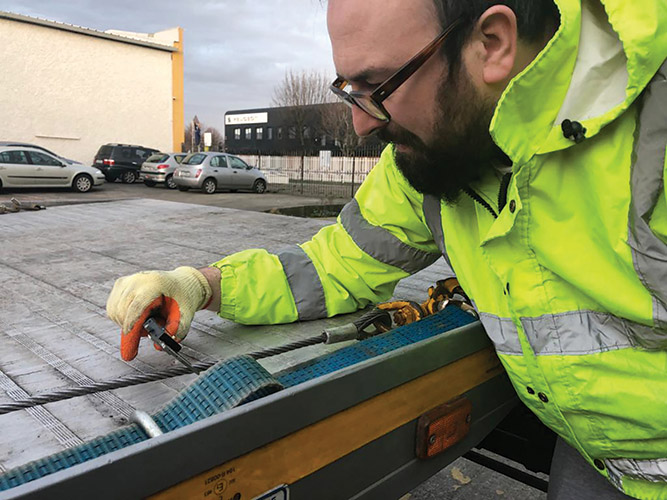RIES is Brexit proof
07/10/2020

Contrary to what some might think, Brexit has no implications for Recovery Industry Engineering Standards (RIES) here in Ireland because its inspections are carried out under EU law.
Conor Brady, who is RIES’s Engineering Surveyor for the Republic of Ireland (Kieran Rice is his counterpart in Northern Ireland), is happy to report that it’s business as usual for the organisation which provides efficient, expert inspections for both Irish and UK businesses and individuals.
“Because we’re a UK-headquartered company, people have been asking about Brexit and whether it has any implications for our Irish customers, but as I inspect under European law, we are Brexit proof,” he explains.
“I currently carry out the vehicle inspections and certification under General Applications Health & Safety Regulations 2007 in the Republic of Ireland. This is a European-wide regulation. The UK legislation is called Lifting Operations & Lifting Equipment Regulations (LOLER) and is very similar, but does not apply in the Republic.
“This requires all lifting equipment to be inspected annually and covers bodies spec lifts, winches, transporter top decks and cranes / top booms. Everything that attaches to a crane / top boom (chains, strops and spreader bars) requires a six-monthly inspection. We inspect and certify trolley jacks and vehicle lifts etc, and also inspect and certify compressors.”
RIES carries out management system audits to PAS 43 standards. This is the specification for the safe working of vehicle breakdown and recovery operations, and aims to improve the safety of breakdown operatives, employees and customers at breakdown and recovery situations. It is recognised by all the breakdown clubs, including AA and RAC, and is a requirement of most state-issued tenders for transport-related contracts.
“The PAS 43 standard is a requirement for most club and insurance work as well as police contracts. As an organisation which promotes good working practice throughout the industry, we are driving the initiative for all recovery operators to possess PAS 43 as a minimum requirement,” Conor adds.
“As in any business, it is important that operators take responsibility for their actions and the actions of their employees. PAS 43 defines minimum levels of competence for those auditing on behalf of certification or inspection. To highlight operators who possess a valid PAS 43 certificate, inspection and certification bodies publish and maintain their details.”
RIES has gone from strength to strength since its inception in 2004. All of its surveyors / assessors are members of the Society of Operating Engineers and Bureau of Engineering Surveyors, and are also lead auditors for ISO standards. The organisation was founded by Derek Beahan and Clive Heathcock – two men who are synonymous with the recovery industry in Ireland and are both past-presidents of AVRO (Association of Vehicle Recovery Operators), which continues to be aligned to RIES.
It was the view of Derek and Clive that RIES could be developed to provide a service to AVRO members at competitive rates. The personnel used to carry out inspections were formerly used by the Association to carry out membership inspections. These engineers were then and still are self-employed.
Shortly after RIES was formed, PAS 43 was introduced following the work carried out by the Survive Group. The need for impartiality and freedom of influence meant that to achieve accreditation by UKAS (United Kingdom Accreditation Service), RIES had to become a separate identity and this accreditation was duly achieved.
In a UKAS inspection, the issue of conflict of interest was raised. This meant that in order for RIES to retain its accreditation, none of the directors could hold a position in AVRO. As a result, Derek Beahan and Clive Heathcock stood down and the reins were handed over to Brian Drury and Davy Holmes in 2009, with Brian becoming financial and training director, and Davy managing director. Both have since taken a step back from the organisation.
There was always an interest in standards among the major recovery players in Ireland who were also AVRO members. In the early days following the introduction of PAS 43, this was taken on board by well-known Dublin operators Derek Beahan, Eamon Kelly and Alan and Cora Sherwood.
While PAS 43 was not a standard in Ireland, it was adopted as best practice. The members’ passion to improve standards saw the PAS applications roll in and RIES now services 43 PAS inspections in the Republic of Ireland and a further 12 in Northern Ireland.
The demand for RIES’ services has surpassed the expectations of its founders. Nowadays, the organisation provides services to both AVRO and non-AVRO members. To meet this need, RIES needed to ensure its engineers were up-to-speed with all equipment they were inspecting and so a training programme was embarked upon and courses were organised.
What it effectively means is that RIES now delivers the following services: General Applications inspections of recovery vehicles; General Applications inspections of garage equipment; Bespoke inspection for Police Forces; PAS43 certification; Compressor inspections; ISO 9001:2015 accreditation; ISO 14001: 2015 accreditation; OHSAS 18001 accreditation.
All inspections are supported with in-depth inspection reports and where necessary, written schemes of inspection.
It’s widely acknowledged in the industry that RIES supplies a first-class service at competitive rates and the quality and content of its reports more than meet the requirements needed. The organisation will continue to attain this standard whilst constantly striving to identify any shortcomings it may have.
To this end, RIES has a programme of client surveys and, if you are a client, RIES values your views as this feedback enables it to focus on its customer requirements and expectations of it as a service provider.
For further information about RIES, please feel free to email Conor Brady at [email protected]
Published in Irish Trucker & Light Commercials magazine, March/April 2020, Vol 23 No 2
